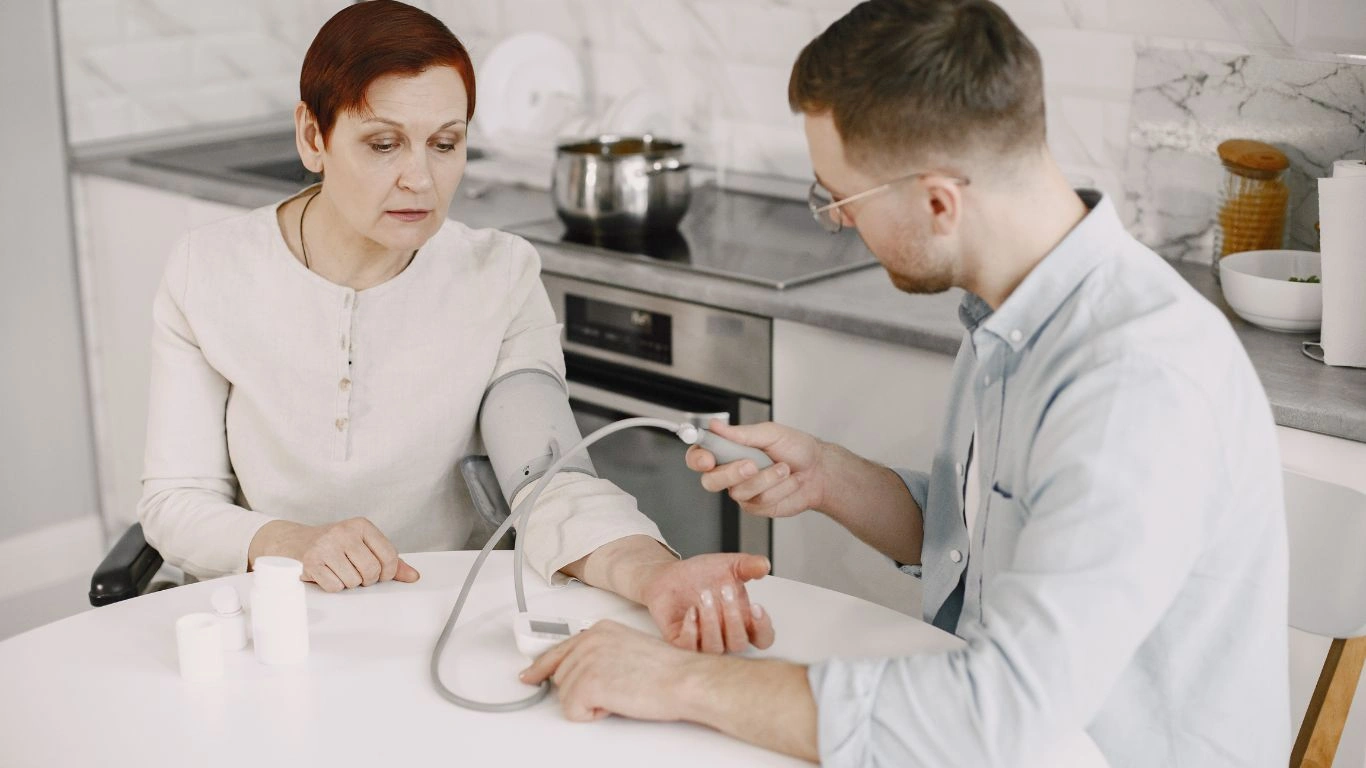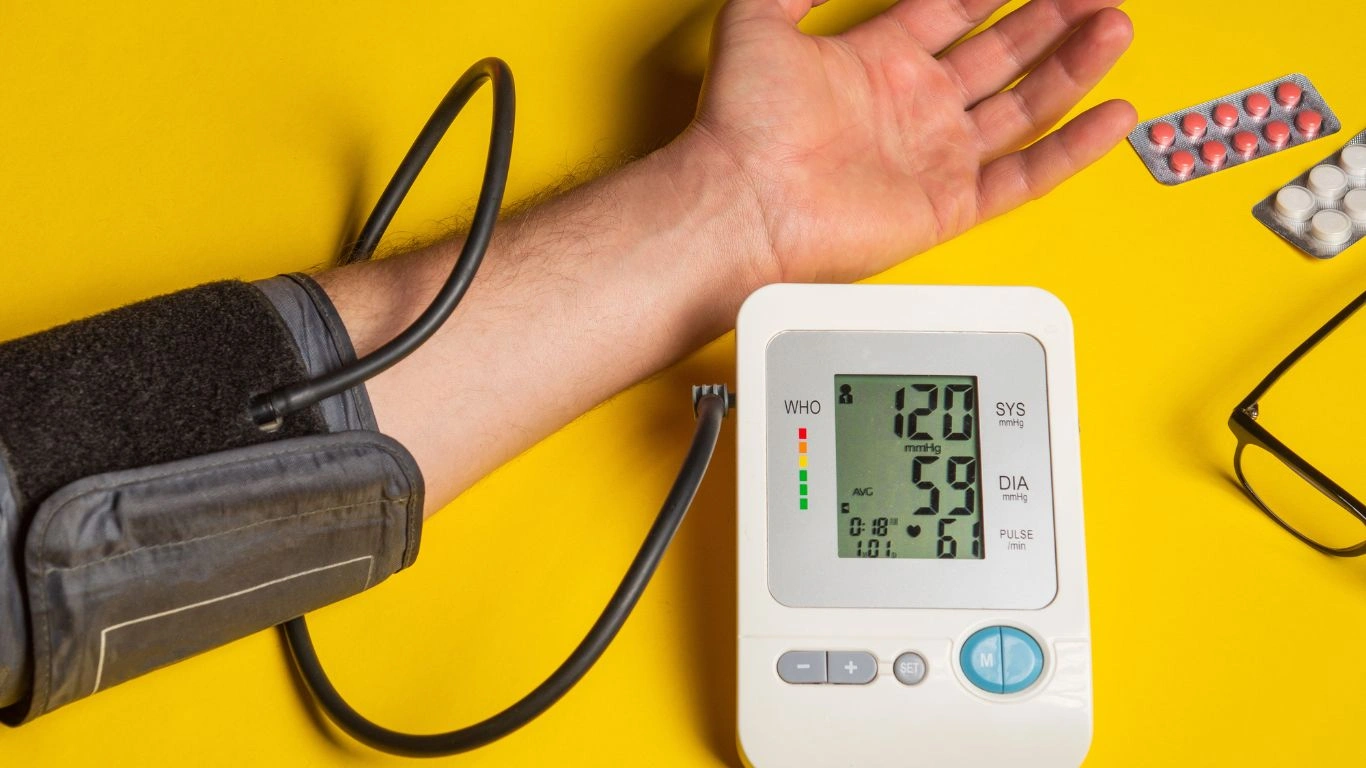“Effective Strategies for Managing Hypertension While Working Night Shifts”
As an Internal Medicine Physician specializing in Hypertension Management, I’ve encountered countless situations where managing hypertension becomes even more challenging for people working night shifts. While it’s crucial for anyone living with high blood pressure to maintain proper lifestyle habits and treatment regimens, those who work irregular hours face unique obstacles. Working at night can throw off the body’s natural rhythm, making it more difficult to stay on top of hypertension management. But don’t worry – you’re not alone in this journey, and there are practical, science-backed strategies that can help you manage hypertension while working those late-night hours.
Understanding Hypertension in Night Shift Workers

First, let’s take a moment to talk about what happens when you work night shifts and how it impacts your blood pressure. Our bodies are designed to follow a natural rhythm known as the circadian cycle. This cycle influences everything from sleep patterns to hormone production, and most importantly, blood pressure regulation. When you disrupt this natural rhythm by working overnight or alternating shifts, it can lead to serious disruptions in the way your body manages stress and maintains normal blood pressure levels.
During the day, your blood pressure naturally rises and falls in response to activity levels and your body’s needs. However, if you’re working night shifts, your body might have trouble keeping up with this natural process, causing your blood pressure to remain elevated longer than it should. In fact, night shift workers are at a higher risk of developing chronic conditions like hypertension, heart disease, and metabolic syndrome because of the disruption to their circadian rhythm. You may be wondering, how do I fight back against this, especially when the demands of the job don’t allow for much control over your schedule?
Why Night Shifts Increase Hypertension Risk

The science behind this isn’t simple, but it’s definitely important. When we sleep, the body naturally lowers blood pressure to give the heart a rest. This drop in pressure is part of what’s known as the nocturnal dip. It’s critical for heart health, allowing our blood vessels to relax and regenerate. But if you’re working night shifts, your body’s biological clock is out of sync, and the regular drop in blood pressure doesn’t happen. This leads to an overall increase in blood pressure, especially if you’re working nights on a regular basis.
Plus, working overnight comes with a host of lifestyle factors that can worsen hypertension. Poor sleep quality, irregular eating habits, and high levels of stress are all more common for night shift workers. These factors combine to make blood pressure management much more difficult. I’ve seen many patients who struggle to balance their work life and their health, and it’s clear that night shifts take a toll in ways we didn’t fully understand a decade ago.
The Role of Sleep in Blood Pressure Regulation

One of the most significant challenges for night shift workers in managing hypertension is the impact that sleep deprivation has on the body. As I always tell my patients, getting quality sleep is essential for regulating blood pressure. In fact, research shows that inadequate or poor-quality sleep can lead to higher blood pressure over time. For night shift workers, this becomes a double-edged sword. Not only is it difficult to get enough sleep when you’re working during the night, but the sleep you do get may not be restorative enough due to disruptions in your natural sleep-wake cycle.
When you’re awake during the night, your body struggles to produce the hormones that promote relaxation and healing. Sleep disturbances can also increase the production of stress hormones like cortisol, which in turn raises your blood pressure. It’s no wonder that many people who work nights end up battling hypertension despite doing everything they can to maintain a healthy lifestyle.
Strategies for Managing Hypertension When Working Night Shifts
So, what can you do to combat this? I’m glad you asked. Managing hypertension while working night shifts requires a multi-faceted approach, blending lifestyle changes with targeted treatments. Over the years, I’ve helped many patients with hypertension navigate this tricky terrain, and I’ve found that a combination of healthy habits, smart scheduling, and, when necessary, medication adjustments can make a huge difference.
1. Prioritize Sleep – Even When It’s Hard
- First and foremost, try to get quality sleep, even if it’s during the day. This means creating a sleep environment that’s as conducive to rest as possible. Use blackout curtains to block out light, and make sure your bedroom is cool and quiet.
- If you find it difficult to sleep during the day, try using earplugs or a white noise machine to mask the noise around you.
- Consistency is key. Even though you’re working night shifts, try to keep your sleep schedule as consistent as possible. Aim for 7-9 hours of sleep whenever you can.
2. Manage Stress Effectively
Stress is a well-known contributor to high blood pressure. If you’re working nights, you might be exposed to more stress than usual, whether it’s from your job or from the challenge of balancing your social life with your work schedule. That’s why it’s crucial to incorporate stress management techniques into your routine. Some ideas include:
- Deep breathing exercises or meditation can help reduce the impact of stress on your body.
- Exercise, even if it’s just a quick walk during your break, can release tension and lower your stress levels.
- Maintaining a supportive network of friends and family is vital – don’t be afraid to reach out when you need emotional support.
3. Monitor Your Blood Pressure Regularly
Being proactive about your health is essential when managing hypertension. Regularly monitoring your blood pressure will give you valuable insights into how your lifestyle changes are affecting your health. It will also help you stay on top of any fluctuations that may require medical attention. If you have a blood pressure cuff at home, I recommend checking it regularly. If not, consider visiting a local pharmacy or your healthcare provider for routine monitoring.
4. Adjust Your Diet
It’s no secret that a healthy diet plays a key role in managing hypertension. While working night shifts, it can be tempting to grab whatever is most convenient, but your body still needs the proper nutrients to function optimally. Some dietary adjustments that can help manage hypertension include:
- Reducing your salt intake – processed foods are often high in sodium, so try to avoid them as much as possible.
- Eating more potassium-rich foods like bananas, leafy greens, and sweet potatoes.
- Staying hydrated with water, rather than caffeinated or sugary beverages, to prevent dehydration, which can elevate blood pressure.
How to Manage Medications When Working Night Shifts

As someone who deals with managing hypertension on a daily basis, I’ve seen firsthand how tricky it can be to stay consistent with medications while working irregular hours. The disruption of your body’s circadian rhythm due to night shifts can also affect how your body absorbs, processes, and reacts to certain medications. If you’re taking antihypertensive medications, it’s critical to understand how shift work can influence the efficacy of your treatment plan.
In my practice, I’ve worked with many patients to optimize their medications to fit their unique schedules. Some medications for hypertension need to be taken at specific times of the day to be most effective, while others might have more flexibility. However, for night shift workers, it’s important to work closely with your doctor to adjust the timing or dosage of medications, so you still get the benefits without interference from your work hours. Here’s how we can approach medication management while working night shifts:
1. Timing is Everything
One of the first things I always discuss with my night shift patients is the importance of timing their medications properly. For some hypertensive medications, like diuretics, taking them too late can lead to frequent trips to the bathroom during work hours, which isn’t ideal. On the other hand, medications like ACE inhibitors or beta-blockers may work best when taken in the evening, so adjusting when you take these meds is key to ensuring that your blood pressure is controlled throughout your shift and into your sleep cycle.
Sometimes, adjusting medication timing might be as simple as taking them before you go to bed during the day rather than at night, while other times it might mean working with your healthcare provider to tweak dosages or switch to long-acting medications that provide 24-hour coverage.
2. Don’t Skip Your Doses
It can be easy to forget to take your medication when you’re juggling the demands of night shifts, especially with irregular sleep schedules and chaotic work hours. However, consistency is key in managing hypertension. Missing doses can lead to spikes in blood pressure and other complications down the road.
If you’re having trouble remembering to take your medication, consider setting alarms or using medication reminder apps. You could also keep your medication in a place where you’ll see it – like next to your work gear or on your nightstand. If you happen to miss a dose, don’t double up the next time – just take your next scheduled dose as usual and speak to your doctor if you have concerns about any missed doses.
3. Talk to Your Doctor About Your Work Schedule
Your doctor is your best resource when it comes to managing your hypertension on night shifts. If you haven’t already, I encourage you to have an open conversation with your physician about how your work schedule is affecting your health. This includes discussing the timing of your medications, the challenges you face with your sleep and lifestyle, and any other concerns you have about managing hypertension while working nights.
By working closely with your healthcare provider, you can develop a personalized treatment plan that addresses the specific challenges that night shift workers face. Sometimes, this might mean switching medications or trying new treatment regimens to make it easier for you to stay on top of your blood pressure control.
Nutrition Tips for Night Shift Workers Managing Hypertension

Now let’s talk about food! One of the most common questions I get from patients working night shifts is how to eat properly while managing hypertension. Trust me, I know how easy it can be to grab unhealthy snacks just to get through the shift, but nutrition is a huge factor in keeping your blood pressure under control. A proper diet not only supports your overall health but can also help mitigate the risks that come with shift work.
When working nights, it can be tempting to load up on caffeine or sugary snacks for an energy boost, but these habits can spike your blood pressure and cause unwanted fluctuations. Instead, aim for balanced meals and snacks that promote steady energy levels and support heart health.
1. Eat Heart-Healthy Foods
There are certain foods that can help lower blood pressure and improve your overall cardiovascular health. These include:
- Leafy greens – Spinach, kale, and other greens are rich in potassium, which helps counteract the effects of sodium and supports healthy blood pressure levels.
- Whole grains – Foods like oats, brown rice, and quinoa provide fiber that helps lower cholesterol and keep blood pressure in check.
- Berries – Blueberries, strawberries, and raspberries are high in antioxidants that support heart health.
- Lean proteins – Fish like salmon and tuna, as well as plant-based proteins, help reduce inflammation and improve blood pressure.
2. Avoid Caffeine and Sugary Snacks
While caffeine can give you a temporary energy boost during night shifts, it can also cause your blood pressure to spike. Additionally, consuming high-sugar snacks or processed foods might give you an energy jolt, but it’s usually short-lived and followed by a crash that leaves you feeling sluggish. I often recommend switching to decaffeinated drinks or opting for herbal teas that are gentle on your system. Also, be mindful of your sugar intake by opting for healthy snacks like nuts or fruit, which provide long-lasting energy without the blood pressure spikes.
3. Stay Hydrated
Staying hydrated is often overlooked, but it’s so important for managing hypertension. Dehydration can cause your blood pressure to rise, which is the opposite of what you want when you’re working night shifts. It’s easy to forget to drink enough water, especially if you’re busy, but try to make it a habit to sip water throughout your shift. If you find plain water boring, you can add lemon or cucumber for flavor – just stay away from sugary drinks or excessive caffeine.
Exercise: The Unsung Hero in Hypertension Management for Night Shift Workers

Exercise is a vital part of managing hypertension, but I get it – when you’re working nights, fitting in a workout can feel impossible. However, incorporating regular physical activity into your routine is one of the most effective ways to lower your blood pressure and improve your overall health. The good news is that you don’t have to hit the gym for hours to see benefits. Even small amounts of physical activity, especially if done consistently, can make a significant impact on your hypertension levels.
1. Find a Routine That Fits Your Schedule
As a night shift worker, your exercise routine needs to be adaptable to your unpredictable schedule. Some people find that working out right after their shift helps them unwind, while others prefer getting in a workout before heading to work to energize them for the night ahead. There’s no right or wrong time to exercise, so do what feels best for your body and fits within your routine.
2. Focus on Cardiovascular Exercise
For hypertensive patients, cardiovascular exercises like walking, jogging, swimming, and cycling are highly beneficial. These exercises get your heart pumping and help reduce overall blood pressure. If you’re short on time, consider taking quick walks during breaks or stretching at your desk to keep your body moving. Even a little movement goes a long way in maintaining healthy blood pressure.
How to Stay Motivated When Managing Hypertension on Night Shifts

By now, you’ve probably realized that managing hypertension while working night shifts isn’t always a walk in the park. In fact, it can feel like you’re constantly juggling multiple tasks, trying to keep your blood pressure in check, stay on top of work, and still find time for yourself. But here’s the thing – it doesn’t have to be overwhelming, and staying motivated is half the battle.
As a physician, I’ve worked with many patients who feel the mental and physical strain of managing their health during irregular work hours. Some feel like it’s too much to handle, especially when they’re tired or stressed. But here’s the truth: small, consistent changes can lead to big results. And with the right mindset, you can make managing your hypertension on night shifts a part of your lifestyle, not a burden. Let’s talk about how you can stay motivated and keep yourself on track.
1. Break It Down: Small Goals, Big Wins
When you’re managing hypertension on night shifts, it’s easy to feel like the task is too big to tackle. Instead of trying to overhaul your entire lifestyle all at once, focus on setting small, achievable goals. These can be as simple as getting an extra 15 minutes of sleep or eating one healthier snack during your shift. Over time, these little victories build up, and you’ll start noticing improvements not only in your blood pressure but also in your overall energy and mood.
For example, if you struggle to find time for exercise, start by taking a 10-minute walk after your shift. Once that becomes a routine, you can gradually increase the duration or add other activities. The key is to keep it simple and not overwhelm yourself with grand expectations. Celebrate each success – no matter how small – because those moments add up to positive long-term change.
2. Track Your Progress
One of the best ways to stay motivated when managing hypertension on night shifts is to track your progress. Whether you’re monitoring your blood pressure or keeping a record of your sleep patterns, seeing improvement over time can give you a huge sense of accomplishment. Personally, I’ve seen many of my patients become more engaged with their health when they see the numbers move in the right direction. It’s not just about the numbers – it’s about recognizing your hard work paying off.
Use a blood pressure monitor at home, or keep a journal of how you’re feeling after a good night’s sleep or a healthy meal. The more you track, the easier it is to see patterns that help you make informed decisions about your health. Plus, you’ll be able to share these insights with your doctor, which can help guide your treatment plan even further.
3. Get Support from Others
Let’s face it – managing hypertension can sometimes feel like a lonely journey, especially when you’re working odd hours. But you’re not alone! Seek support from friends, family, or coworkers who understand what you’re going through. Sharing your experiences with others who face similar challenges can help you feel more connected and less isolated.
If you can’t find someone who works night shifts and understands the specific challenges you face, consider joining an online community or support group for people managing hypertension. Sometimes just hearing someone else’s story or getting advice can give you the motivation you need to keep going. And remember, reaching out for help is a sign of strength – not weakness!
4. Don’t Be Too Hard on Yourself
It’s so easy to get discouraged when things don’t go perfectly, and trust me, I’ve seen this in my practice countless times. If you slip up on your diet or miss a workout, don’t beat yourself up. The journey to managing hypertension while working night shifts is a marathon, not a sprint. Life will throw curveballs, and sometimes you might need to adjust your plan. The important thing is to get back on track without guilt or shame.
Sometimes the biggest motivator is giving yourself grace. Know that you’re doing the best you can, and even on tough days, you’re making progress. Acknowledge the bumps in the road, but don’t let them derail your efforts. With persistence and patience, you’ll be able to manage your hypertension, even during those long night shifts.
Creating a Sustainable Routine for Hypertension Management
One of the biggest keys to success when managing hypertension on night shifts is creating a sustainable routine. I’ve had patients who’ve tried to follow overly complicated or rigid schedules, only to find themselves burned out after a few weeks. That’s why it’s important to set up a routine that works with your lifestyle, not against it.
1. Balance Work and Rest
As someone who works in a demanding field like Internal Medicine, I know how easy it is to push yourself too hard. However, overworking yourself – both physically and mentally – can have serious consequences for your health, including your blood pressure. I’ve seen this firsthand with patients who work night shifts but fail to prioritize enough sleep or rest. Over time, this leads to exhaustion, which only worsens hypertension and increases the risk for other health problems.
Balancing work and rest is essential for hypertension management. Whether you’re getting ready for a shift or winding down after one, make sure you carve out time for rest. Your body needs it to regenerate and lower your blood pressure. For some, this may mean setting strict boundaries for when work is over and personal time begins. For others, it could be about learning to say no to additional tasks that add unnecessary stress.
2. Build Flexibility Into Your Schedule
Flexibility is key when you work night shifts, especially when it comes to your self-care routine. Life happens, and some days your schedule might not go as planned. The key is to build flexibility into your routine without sacrificing your health. For example, if you miss your morning walk because of a last-minute task, make it a point to fit it in after your shift. If you don’t have time for a full meal, opt for a nutritious snack until you can eat a proper meal later.
Creating room for flexibility ensures that you don’t get discouraged when things don’t go perfectly. It also helps you maintain consistency without overwhelming yourself. With the right approach, you can build a routine that works for both your work schedule and your health.
References
If you’re looking for more information on managing hypertension, check out reputable resources like the American Heart Association and the Centers for Disease Control and Prevention (CDC) for additional tips, strategies, and guidelines on blood pressure management.
Disclaimer
The information provided in this article is intended for informational purposes only and should not be considered medical advice. Always consult with your healthcare provider before making any changes to your treatment plan or lifestyle. The author is not responsible for any adverse effects or consequences resulting from the use of any information in this article.

Dr. Gwenna Aazee is a board-certified Internal Medicine Physician with a special focus on hypertension management, chronic disease prevention, and patient education. With years of experience in both clinical practice and medical writing, she’s passionate about turning evidence-based medicine into accessible, actionable advice. Through her work at Healthusias.com, Dr. Aazee empowers readers to take charge of their health with confidence and clarity. Off the clock, she enjoys deep dives into nutrition research, long walks with her rescue pup, and simplifying medical jargon one article at a time.







